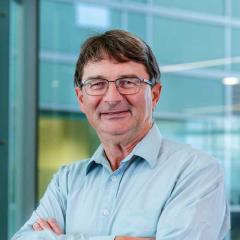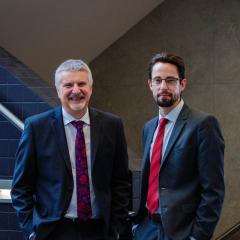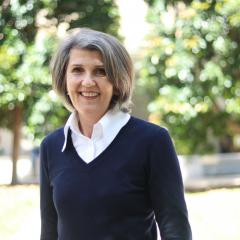Dr Tina Skinner believes exercise should be the new drug of choice for people with cancer and cancer survivors.
And, if her research discoveries are anything to go by, the evidence stacks up.
“Exercise is medicine for people with cancer and for cancer survivors, and it should be prescribed just like any other medicine,” she says.
Dr Skinner’s exercise oncology team – UQ’s Associate Professors David Jenkins and Michelle Hill, and PhD student James Devin, Griffith University’s Professor Suzanne Chambers, Cancer Council Queensland’s Professors Jeff Dunn and Joanne Aitken, and collaborators from Canada and Sweden – were the first to show that high-intensity exercise can reduce tumour growth while providing significant physical and psychological benefits for cancer survivors.
The team took a group of bowel cancer survivors and prescribed half of the group 4 x 4 minutes of high intensity interval training (HIIT) three times per week, while the other half undertook the current physical activity guidelines of 150 minutes of moderate intensity exercise per week.
“The results were extraordinary. After just eight weeks, the people in the HIIT group showed superior and accelerated improvements in cardiorespiratory fitness compared to the group meeting current physical activity guidelines, as well as reductions in fat mass. This amount of improvement has been shown to relate to a 10 per cent reduction in mortality.
“Furthermore, the improvements in cardiorespiratory fitness were maintained even with a reduced frequency of training and after four weeks of complete withdrawal of exercise training.”
For Dr Skinner’s team, the next step is to examine the anti-carcinogenic effects of high-intensity exercise on tumour growth and cancer re-occurrence.
“Our latest research has demonstrated that just a single session of high-intensity exercise can reduce colon cancer cell numbers, while moderate intensity exercise had no effect.
“We will now explore whether repeated exposure to high-intensity exercise may have anti-cancer benefits and subsequently improve the prognosis for people with cancer.
“If the results are positive, it will suggest that high-intensity exercise could potentially help reduce the risk of cancer reoccurrence, improving survival rates, and adding years to someone’s life.”
The current physical activity guidelines for people with cancer and cancer survivors is the same as the Federal Government’s recommendations for all adults, involving moderate to vigorous intensity exercise, but not high intensity exercise.
Dr Skinner says that the study results suggest high intensity exercise may actually give superior and more sustained benefits than the current guidelines, in less time.
This is not her only study that shines the spotlight on high-intensity exercise, having recently demonstrated that HIIT can radically reduce post-cancer fatigue.
The finding contradicts traditional advice that cancer survivors should take things easy in recovery, and stick to gentle exercise like walking or yoga, and even current recommendations suggesting moderate intensity exercise.
“Fatigue is one of the most common and debilitating side effects of cancer, and can persist for up to 10 years beyond treatment.
“We were encouraged to find that under the supervision of Accredited Exercise Physiologists, bowel cancer survivors were capable of high intensity exercise, reported high levels of enjoyment, and experienced no serious adverse effects.”
After the study was complete, they found those who endured the tougher workouts actually reported more energy and less fatigue overall, while those who performed the moderate intensity routine experienced consistently high levels of fatigue.
“When you have just beaten a bout of cancer it seems counterintuitive to push yourself hard in a gym, but it appears to be the quickest and most effective way to get patients feeling like their old selves.”
Given the success of these recent studies, Dr Skinner is now collaborating with community-based exercise physiology services to introduce new protocols in their practices.
She is hopeful that her research will inform cancer guidelines by the inclusion of an exercise prescription into a cancer survivor’s care plan, and for cancer rehabilitation services to refer people diagnosed with cancer to an Accredited Exercise Physiologist.
Translation of research into practice is vital for meaningful improvements in health care services. However, as Dr Skinner points out, people with cancer and cancer survivors will only benefit from this research if they actually do the exercise.
“While the benefits of exercise for people with cancer and survivors is unquestionable, research shows that most cancer survivors are inactive. A recent Edith Cowan University study found that only 12 per cent of Australian men with prostate cancer were meeting physical activity guidelines.
“Even in healthy populations exercise adherence is a challenge. It’s not easy to keep people exercising. We think peer-support may be the key. That’s why one of our current projects is exploring peer support for exercise engagement and maintenance.”
This randomised control trial will extend Cancer Council Queensland’s structured peer-support program from psychological support to include exercise support.
Combined with a HIIT program, the trial aims to test whether peers can help cancer survivors maintain exercise participation, and subsequently improve their fatigue, sleep, physical function and psychosocial wellbeing.
If successful, the goal is to roll out the peer-support program into the Cancer Council Queensland exercise clinics for cancer survivors, and hopefully expand the program across Australia.
Along with clinical research, Dr Skinner lectures to clinical exercise physiology students and supervises Masters and PhD students. She is particularly enthusiastic about the Exercise Clinic for People with Cancer at UQ.
“This clinic is fantastic. It invites people with cancer and survivors to participate in exercise under the close supervision of Accredited Exercise Physiologists and fourth year Clinical Exercise Physiology students.
“We have been running the clinic for over seven years and it has helped hundreds of people improve their physical and psychological health, and meet their health and exercise goals.
“Exercise really is medicine for people with cancer.”
Words: Caroline Day
Photos: Anjanette Webb



